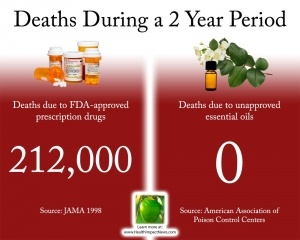
By Alliance for Natural Health [1]
What should you stock to protect yourself?
Recently we reported that, while many across the country were concerned about measles, which occurs in a largely vaccinated population and has caused no deaths, a larger threat wasn’t receiving proper attention: drug-resistant tuberculosis—and antibiotic-resistant “superbugs” in general. These infect at least two million Americans each year and kill 23,000, according to the Centers for Disease Control and Prevention (CDC) [2].
As we’ve reported previously [3], superbugs are created through antibiotic overuse—both by doctors who rely too heavily on antibiotics and by industrial farming operations. Consider these statistics: a Medscape poll found that 95% of healthcare professionals said they prescribe antibiotics when they aren’t even sure they’re needed [4]. A whopping 70% of all antibiotics [5] used in the US are used on livestock.
But there is another, lesser-known contributor to what is regarded as one the world’s largest public health threats: pharmaceutical companies.
According to Karl Rotthier [6], the chief executive of a Dutch-based pharmaceutical firm, antibiotics are making their way into rivers and waterways due to lax safety measures. Some of the drugs are flushed directly down the toilet, while others pass through the patients first—and it all ends up in the water supply. Too many drugs come from manufacturing waste. Some rivers in India, in fact, have higher concentrations of active antibiotics than have been consumed by all the patients who were prescribed the drugs.
“Poor controls mean that antibiotics are leaking out and getting into drinking water,” Rotthier said. “They are in the fish and cattle that we eat, and global travel and exports means that bacteria travel. That is having a greater contribution to the growth of antibiotic resistance than overprescribing.”
To make matters worse, a recent Texas Tech study [7] found evidence that antibiotic-resistant bacteria from feedlots can be dispersed through the air. It has been known for a while that resistant bacteria can spread through manure and water, but this study is the first study [8] to indicate that superbugs can become airborne and infect humans that come into contact with them.
As dire a problem as antibiotic resistance now is, conventional medicine’s answer is to research and develop ever more drugs and continue down the same path of “one-size-fits-all” medicine that, as we’ve seen, is not sustainable.
Fortunately, and as many regular readers will know, there are alternatives to using pharmaceutical antibiotics:
- We’ve reported on [9] the anti-pathenogenic properties of colloidal silver, the world’s oldest known antibiotic.
- Two studies have now linked vitamin D to the successful prevention and treatment of TB. In the first study [10], white blood cells converted vitamin D to an active form of the vitamin, which helps make a protein that kills the TB bacterium. In the second study [11], Indonesian scientists compared vitamin D to a placebo, testing both on seventy patients for nine months. The patients who received 10,000 IU of vitamin D (rather than the 600 IU recommended by conventional medicine) had an astounding 100% cure rate.
- Some evidence suggests [12] that vitamin C could be effective in fighting antibiotic resistant infections.
- There have also been studies [13] showing that ozone therapy—which increases the amount of oxygen in the body—can be an effective treatment for TB.
Further, a recent article in The Atlantic [14] magazine highlighted the antimicrobial qualities of plant extracts and essential oils. The article notes that “various oils have also been shown to effectively treat a wide range of common health issues such as nausea and migraines, and a rapidly growing body of research is finding that they are powerful enough to kill human cancer cells of the breast, colon, mouth, skin, and more.”
The article indicates that the most immediate, practical application of this knowledge is on farms to reduce antibiotics used on livestock, one of the largest drivers of antibiotic resistance. But preliminary results have been encouraging for human use as well:
- An Italian study [15] found that thyme and clove essential oils were effective in treating bacterial vaginosis.
- A US study [16] found tea-tree oil was a more effective treatment for staph-infected wounds than conventional treatments.
- Additional research [17] found that lemongrass oil could reduce MRSA.
It is becoming increasingly clear that conventional medicine cannot continue on its present course—otherwise, superbugs will certainly infect (and potentially kill) large percentages of the population. Integrative approaches offer a number of alternatives. Conventional medicine and the Big Pharma-financed media may scoff, but the science is firmly on our side.
Read the full article here. [1]

